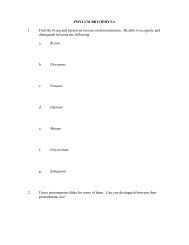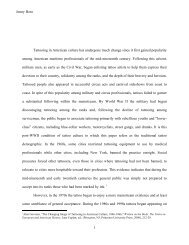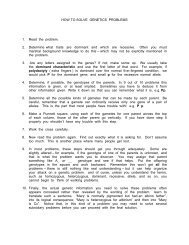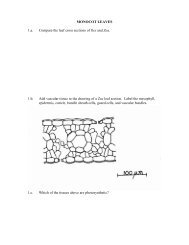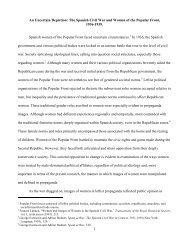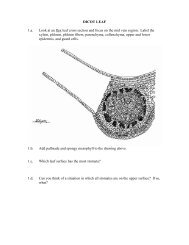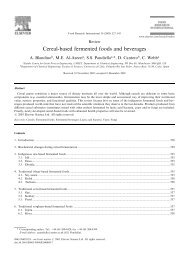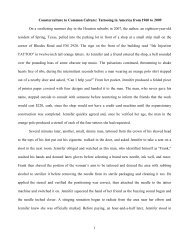Meat - Facing the Dilemmas
Meat - Facing the Dilemmas
Meat - Facing the Dilemmas
Create successful ePaper yourself
Turn your PDF publications into a flip-book with our unique Google optimized e-Paper software.
Where next?<strong>Meat</strong> consumptionIf government can take on flying it can take on meatRussell Marsh<strong>Meat</strong> and dairy consumption accounts foraround eight percent of UK greenhouse gasemissions – not far off <strong>the</strong> contribution fromaviation. But, in <strong>the</strong> debate about climatechange we don’t hear much about meat’scarbon impact; it doesn’t make headlines orform part of policy proposals.Yet this will change. The climate changebill, announced in <strong>the</strong> Queen’s Speechin November, will lock this and futuregovernments into legally binding emissionreduction targets to 2020 and 2050. Giventhat UK CO2 emissions are currently rising,meeting <strong>the</strong>se targets for a 26-32 percentreduction by 2020 and a 60 percent reductionby 2050 is going to be very challenging.Reaching <strong>the</strong>se targets is going to requireaction in every sector of <strong>the</strong> economy. Bothaviation and farming will have to be a partof this.Despite a similar level of emissions, aviationgets more attention than meat and dairy.Though <strong>the</strong> UK government was initiallyhesitant to tackle people’s ‘freedom to fly’,it is now leading European efforts to bringaviation into <strong>the</strong> EU Emissions TradingScheme and it has recently announced thatit will levy a ‘carbon tax’ on planes leaving<strong>the</strong> UK. And industry is responding. Airlinesare falling over <strong>the</strong>mselves to be seen as<strong>the</strong> greenest, while <strong>the</strong> Soil Association andmajor supermarkets are grappling with <strong>the</strong>environmental and social footprint of airfreightingfood.There are precedents forintervening in peoples’lifestyles where <strong>the</strong>re is aclear public benefitBy contrast, <strong>the</strong>re has been little fuss aboutmeat and dairy. Why? Because it is highlysensitive. Diet is an emotive, personal issueand most people don’t want <strong>the</strong> governmenttelling <strong>the</strong>m what <strong>the</strong>y should and shouldn’teat. The worry is that <strong>the</strong> only way to tacklethis issue is to try and persuade people to bevegetarian or vegan. This would be politicallyimpossible.But, as <strong>the</strong> recent actions on obesity andsmoking have shown, and indeed <strong>the</strong>action on aviation, <strong>the</strong>re is a precedent forintervening in people’s lifestyles where <strong>the</strong>reis a clear public benefit.So what can we learn from action in <strong>the</strong>se twoareas that may help in developing appropriateinterventions for <strong>the</strong> meat and diary sectors?The smoking and obesity debates show ustwo things. First, that <strong>the</strong> links to health areimportant, and may, for food, be a strongerdriver for action than climate change. There isplenty of evidence that a more balanced dietcontaining less animal protein is better foryou. A communications initiative linked to<strong>the</strong> health benefits of a diet lower in animalprotein is likely to have more resonance thanone purely focussed on <strong>the</strong> carbon impacts.The second thing <strong>the</strong>y show us is <strong>the</strong>importance of information and evidence.If <strong>the</strong> government is going to take action itneeds a robust evidence base to justify anyintervention. For obesity and smoking thisevidence was readily available and is nowbroadly accepted by <strong>the</strong> public. The samecannot be said for <strong>the</strong> carbon impacts of ourfood, although this is starting to change:research in this area is starting to providesome compelling figures.Likewise, if <strong>the</strong> government wantsindividuals to take a particular action – ea<strong>the</strong>althier food for example – <strong>the</strong>y need toprovide us with <strong>the</strong> information that enablesus to make <strong>the</strong> right choices. This in turn willhelp drive <strong>the</strong> market in <strong>the</strong> right direction.In nutrition this is happening though foodlabelling. Retailers and producers are nowproducing, selling, and advertising morenutritionally balanced products.Labels are being introduced specifying <strong>the</strong>carbon footprint of food under an initiativeby <strong>the</strong> Carbon Trust. A number of retailersand individual food companies are startingto calculate <strong>the</strong> carbon footprint of <strong>the</strong>products <strong>the</strong>y produce and sell. This is giving<strong>the</strong> industry much better information about<strong>the</strong> carbon emissions associated with <strong>the</strong>irproducts and where in <strong>the</strong> supply chain thoseemissions arise. Not surprisingly, severalhave discovered that <strong>the</strong> big carbon impactscome from producing <strong>the</strong> raw materials.Often this means meat and dairy. As thisevidence base develops it will increase <strong>the</strong>focus on <strong>the</strong> need to tackle greenhouse gasemissions from <strong>the</strong> livestock sector.So, things are starting to happen. It islikely that <strong>the</strong> combination of <strong>the</strong> ClimateChange Bill and carbon footprinting foodproducts will increase pressure to takeaction in farming. Yet this is unlikely to beenough. Look again at <strong>the</strong> aviation industry.Information on <strong>the</strong> carbon implications offlights alone does not change <strong>the</strong> frequencywith which people fly. The question for meatand dairy is whe<strong>the</strong>r <strong>the</strong> government will bebold enough, as it has been in o<strong>the</strong>r areas,to respond to <strong>the</strong> evidence and intervenefur<strong>the</strong>r.Will government be boldenough to intervene overmeat and dairy?It could start with <strong>the</strong> food provided throughits own institutions and on <strong>the</strong> public estate,and commit to reducing <strong>the</strong> animal proteincontent (or <strong>the</strong> carbon emissions) of <strong>the</strong>meals served. And perhaps <strong>the</strong> time has cometo consider how to introduce a carbon priceinto this market to focus <strong>the</strong> industry ondeveloping low-carbon solutions. Whatever<strong>the</strong> government chooses to do, it will have todo something – it cannot ignore this sectorany longer.Russell Marsh is Head of Policyat Green Alliance, which workswith senior people ingovernment, parliament,business and NGOs to makeenvironmental solutions apriority in British politics.rmarsh@green-alliance.org.ukwww.foodethicscouncil.org | Volume 2 Issue 4 | Winter 2007 17



